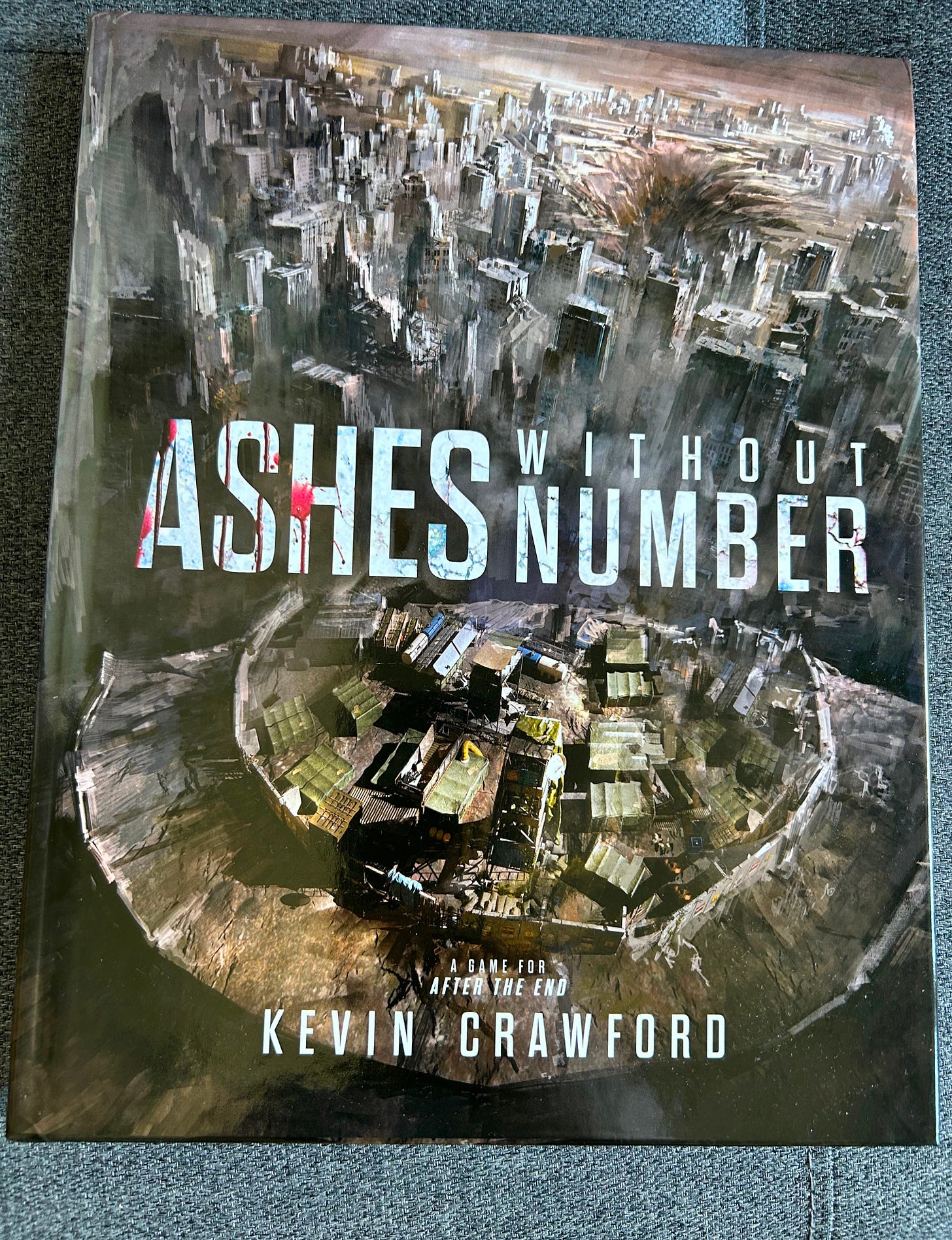I would like to share some early unstructured thoughts from reading the new post-apocalyptic game Ashes Without Number by Kevin Crawford which I’d backed on Kickstarter, and recently received. As is typical of Kevin’s work, you can download a free version of it from DriveThru RPG.
If you’ve been living under a rock, the Without Number game series is best known for its excellent GM tools aimed at running sandboxes, and for having practically complete free versions of every game. The previous Sci-Fi, Fantasy, and Cyberpunk games are now joined by their post-apocalyptic sister. Mechanically, it is a blend of D&D and Traveller mechanics, which makes adapting modules written for either easy. I’ve run a year-long campaign of Cities Without Number but haven’t had a chance to bring Ashes Without Number (AWN) to the table yet.
Some thoughts in no particular order:
AWN is the most flexible toolkit of the series so far. It provides advice and tools for three styles of post-apocalypse: mutant wastelands, zombie apocalypse, and a more down-to-earth societal collapse. It provides several optional rules that you can pick and choose to support the exact vibe you need mechanically. In the paid part, it even has some genre-appropriate magic rules, and I feel it can easily cover low-fantasy campaigns, as well.
Kevin’s writing is typically somewhat cerebral and dry but it’s obvious he’s getting better at it with time. AWN reads pretty well.
I love the enclave rules. They build on his faction rules from previous games but feel more flexible. E.g., he removed set assets factions could have, and is using descriptive “Features” instead.
This is not the only nod to more narrative games. E.g., he includes an optional rule for a heroic last stand: you accept that your character will die in the aftermath in exchange for becoming nigh invincible for a scene. I’d previously only encountered this kind of rule in Orbital Blues.
The GM advice is short but refined and on point. I feel like Kevin learns to say more with less words with every book.
I like that he uses the 3-mile/5-kilometer hex in this book. I’ve been convinced by the blogosphere that this is the superior hex size.
I wish this game were a tiny bit less crunchy. There are a lot of moving pieces. However, it will still be easier to run than Cities Without Number: hacking and cyberware were major sources of crunch, and they are absent here.
This is true of all of Kevin’s games but the game mechanics are in a weird spot. AWN is not a rules-light game, and the character sheet has a lot going on. Instinctively, it would fit better with (neo)trad gaming, as you need to invest in creating a character, and every character is pretty distinctive from the start. However, it is very lethal (and this game even more than the previous ones), and its advice is firmly in the OSR camp: may the dice fall where they may. If a character dies, they die. There is a reason why the book suggests creating replacement characters before the start of the game: it takes too long to create one to whip one up on the spot if needed. Rules-light games like Into the Odd, Cairn or Mörk Borg are better fits for highly lethal games in that sense. Creating a character takes a minute or two. You can roll a character, whereas AWN has some rolling but also some necessary decisions (picking Edges and a Focus for example).
I strongly agree with Chris McDowall’s advice in Electric Bastionland who tells the GM to not “keep your best ideas for later. Use them right
away.” Because of that, I am not a fan of games with levels. I know a lot of people like that feeling of a zero-to-hero journey, and rapid character progression but to me, level-based systems create a weird sort of gatekeeping. There are certain challenges the group cannot reasonably undertake unless they level up (or you start them at a high level). As a GM, you have to always consider the interplay of the group power and the challenges you provide. AWN is a level-based game. I wish it weren’t.
All in all, I have high hopes for this game and I want to run it if I can. Or alternatively use its many GM procedures with Eco Mofos!!, depending on the tone of the campaign I settle on.



To summarize a short discussion from Discord about the game: *WN is, for better or worse, the middleman game. The trad game for sandboxers (or OSR game for trad players). It's Traveller for DnDers (or vice versa). Etc.